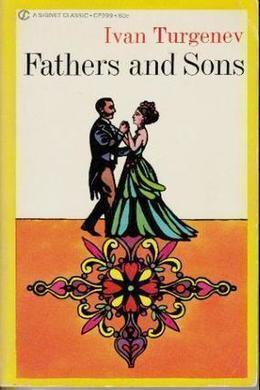
-
EPUB 398 KB
-
Kindle 473 KB
-
Support epubBooks by making a small $2.99 PayPal donation purchase.
Description
When a young graduate returns home he is accompanied, much to his father and uncle’s discomfort, by a strange friend ‘who doesn’t acknowledge any authorities, who doesn’t accept a single principle on faith.’ Turgenev’s masterpiece of generational conflict shocked Russian society when it was published in 1862 and continues today to seem as fresh and outspoken as it did to those who first encountered its nihilistic hero.
298 pages with a reading time of ~4.75 hours (74616 words), and first published in 1862. This DRM-Free edition published by epubBooks, 2014.
Community Reviews
There are currently no other reviews for this book.
Excerpt
‘Well, Piotr, not in sight yet?’ was the question asked on May the 20th, 1859, by a gentleman of a little over forty, in a dusty coat and checked trousers, who came out without his hat on to the low steps of the posting station at S—-. He was addressing his servant, a chubby young fellow, with whitish down on his chin, and little, lack-lustre eyes. The servant, in whom everything–the turquoise ring in his ear, the streaky hair plastered with grease, and the civility of his movements–indicated a man of the new, improved generation, glanced with an air of indulgence along the road, and made answer: ‘No, sir; not in sight.’ ‘Not in sight?’ repeated his master. ‘No, sir,’ responded the man a second time. His master sighed, and sat down on a little bench. We will introduce him to the reader while he sits, his feet tucked under him, gazing thoughtfully round. His name was Nikolai Petrovitch Kirsanov. He had, twelve miles from the posting station, a fine property of two hundred souls, or, as he expressed it–since he had arranged the division of his land with the peasants, and started ‘a farm’–of nearly five thousand acres. His father, a general in the army, who served in 1812, a coarse, half-educated, but not ill-natured man, a typical Russian, had been in harness all his life, first in command of a brigade, and then of a division, and lived constantly in the provinces, where, by virtue of his rank, he played a fairly important part. Nikolai Petrovitch was born in the south of Russia like his elder brother, Pavel, of whom more hereafter. He was educated at home till he was fourteen, surrounded by cheap tutors, free-and-easy but toadying adjutants, and all the usual regimental and staff set. His mother, one of the Kolyazin family, as a girl called Agathe, but as a general’s wife Agathokleya Kuzminishna Kirsanov, was one of those military ladies who take their full share of the duties and dignities of office. She wore gorgeous caps and rustling silk dresses; in church she was the first to advance to the cross; she talked a great deal in a loud voice, let her children kiss her hand in the morning, and gave them her blessing at night–in fact, she got everything out of life she could. Nikolai Petrovitch, as a general’s son–though so far from being distinguished by courage that he even deserved to be called ‘a funk’–was intended, like his brother Pavel, to enter the army; but he broke his leg on the very day when the news of his commission came, and, after being two months in bed, retained a slight limp to the end of his days. His father gave him up as a bad job, and let him go into the civil service. He took him to Petersburg directly he was eighteen, and placed him in the university. His brother happened about the same time to be made an officer in the Guards. The young men started living together in one set of rooms, under the remote supervision of a cousin on their mother’s side, Ilya Kolyazin, an official of high rank. Their father returned to his division and his wife, and only rarely sent his sons large sheets of grey paper, scrawled over in a bold clerkly hand. At the bottom of these sheets stood in letters, enclosed carefully in scroll-work, the words, ‘Piotr Kirsanov, General-Major.’ In 1835 Nikolai Petrovitch left the university, a graduate, and in the same year General Kirsanov was put on to the retired list after an unsuccessful review, and came to Petersburg with his wife to live. He was about to take a house in the Tavrichesky Gardens, and had joined the English club, but he died suddenly of an apoplectic fit. Agathokleya Kuzminishna soon followed him; she could not accustom herself to a dull life in the capital; she was consumed by the ennui of existence away from the regiment. Meanwhile Nikolai Petrovitch had already, in his parents’ lifetime and to their no slight chagrin, had time to fall in love with the daughter of his landlord, a petty official, Prepolovensky. She was a pretty and, as it is called, ‘advanced’ girl; she used to read the serious articles in the ‘Science’ column of the journals. He married her directly the term of mourning was over; and leaving the civil service in which his father had by favour procured him a post, was perfectly blissful with his Masha, first in a country villa near the Lyesny Institute, afterwards in town in a pretty little flat with a clean staircase and a draughty drawing-room, and then in the country, where he settled finally, and where in a short time a son, Arkady, was born to him. The young couple lived very happily and peacefully; they were scarcely ever apart; they read together, sang and played duets together on the piano; she tended her flowers and looked after the poultry-yard; he sometimes went hunting, and busied himself with the estate, while Arkady grew and grew in the same happy and peaceful way.
